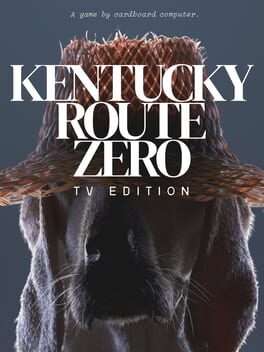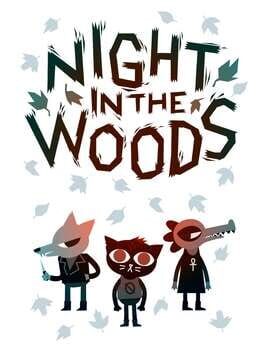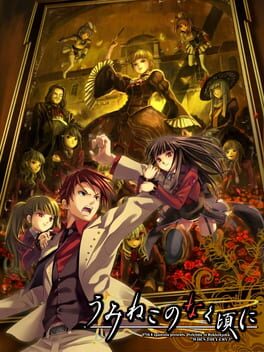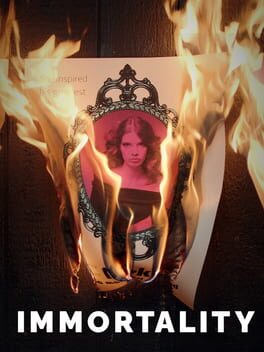adjansen
Bio
they/them
Mostly narrative games, mostly pc. Usually do not have time/patience for challenge. CASUALCORE
they/them
Mostly narrative games, mostly pc. Usually do not have time/patience for challenge. CASUALCORE
Badges

Adored
Gained 300+ total review likes

Trend Setter
Gained 50+ followers

Loved
Gained 100+ total review likes

Well Written
Gained 10+ likes on a single review

Gone Gold
Received 5+ likes on a review while featured on the front page

2 Years of Service
Being part of the Backloggd community for 2 years

Popular
Gained 15+ followers

Donor
Liked 50+ reviews / lists

Best Friends
Become mutual friends with at least 3 others

Noticed
Gained 3+ followers

Liked
Gained 10+ total review likes
Favorite Games
034
Total Games Played
000
Played in 2024
001
Games Backloggd
Recently Reviewed See More
Umineko seems to be a love-it-or-hate-it experience for a lot of people. It was more of a love-it-and-hate-it kind of thing for me. There is just...so much packed into this story, both good and bad! The good is super good, but the bad is also pretty bad. For the sake of my sanity, this is going to be more of a list than a proper review.
Loved:
(1) The premise. Umineko is, from the start, just a really fun genre parfait. You’ve got mystery, horror, and fantasy tropes in there, mixed with nice crunchy bits of gothic family drama, and it’s all drizzled with a metafictional fudge on top. It’s a unique set-up with tons of atmosphere and so much storytelling potential.
(2) The characters. Umineko has a huge cast of memorable characters brought to life by some of the best voice acting I have ever heard. I could listen to Ohara Sayaka cackle all day long. (If you like evil laughter, Umineko occupies at least, like, six out of ten spots in the Top Ten Best Evil Laughs in Video Games.) The character writing in general is extremely good. It’s possible to forget—for hours at a time—that these are silly-looking sprites in a goofy anime game, because they feel so much like real people. Even the most despicable characters remain compelling (Rosaaaa), and all of the relationships, especially the family dynamics, are believable and complex.
(3) The themes. Umineko is thematically ambitious to a fault, but it’s refreshing to see a story just really go for it. There are so many Big Ideas in this game. While I’m doubtful that it succeeds in saying much of anything sensible in the end, I appreciate that it is earnestly trying to say something—often several things at once—and if I had, oh, a few hundred spare hours of free time lying around, I might be tempted to read it a second time to peel back more of the layers.
(4) The artwork. I know I called the sprites “silly-looking” (they are) but Ryukishi’s art really grows on you—the clumsiness is endearing and the facial expressions are wonderful. (I hate the console and pachinko sprites but ymmv.)
(5) The soundtrack. It’s banger after banger p much.
Hated:
(1) The otaku shit. Umineko was written for an audience of hardcore VN fans. Every time I was reminded of this target audience, and how much I do not belong to it, it was like nails on a chalkboard. They aren’t so pervasive as to ruin the experience, but the pandering in-jokes and fanservicey moments really pulled me out of the story. Moreover, the game was released serially for the most dedicated fans to devour chapter by chapter, line by line, going over each scene with a fine-tooth comb for clues. Many of the storytelling choices make less sense removed from this original context. I often felt like the author was being maddeningly opaque for no reason; in fact, he is being opaque on purpose (to give fans more grist for the theory-crafting mill), but unless you have approximately ten zillion hours of free time to set aside for note-taking and puzzle-solving, this habit of never saying anything directly will likely just drive you up the wall.
(2) The mysteries. Umineko is not really about the mysteries—it’s more interested in the abstract concept of Mystery Fiction than in the nitty-gritty details of each murder—but, on the other hand, it’s not really not about the mysteries, since they take up at least a hundred hours of the time you will spend reading this dang thing (and considerably more time than that if you actually try to solve them). It is a shame, then, that the mysteries kinda blow. Ryukishi wants us to believe that the “whodunnit”—it was Colonel Mustard in the library with a candlestick!—is less important than the “whydunnit,” the tortured heart behind the crimes. But the one time that “whydunnit” matters, it is explained in such a convoluted way as to be virtually nonsensical, and actually made me understand the character less than I did before. You also have to wait seven chapters for this motive to be revealed—and that’s it. That’s all you get. The rest of the mysteries are just soulless logic puzzles. The author has so little interest in them by the end that he just sweeps them all aside in a single scene—and frankly I don’t blame him, because the solutions are so underwhelming, I wouldn’t want to draw any attention to them either. A few questions are raised which do have satisfying answers, but they are mostly regarding background details; overall, Umineko is far more successful as a story about mysteries than as a mystery story.
(3) The themes. I know I said I liked the themes, but the thematic ambition of Umineko is also kind of its downfall. Especially in the second half, the more Ryukishi tries to draw all these thematic threads together into a bow, the more they get tangled up in a big perplexing wad of nothing. Part of the problem is a terminal case of trying to have his cake and eat it too. Like, do the mysteries matter, or don’t they? If the pursuit of a single truth is so wrongheaded, why expend so many thousands of words encouraging readers in that pursuit? Why must love and truth, empathy and reality, be diametrically opposed? The last chapter, rather than bringing clarity to these contradictions, retreats into boring cliches, and sometimes plain old falsehoods. It is quite seriously suggested that the only way to overcome trauma, actually, is to run away from reality and escape into a fantastical delusion, because, uhhh, that’s the power of magic, folks?? Ryukishi’s best writing is rooted in his experience as a social worker, and his sharp observations of human behavior, but every once a while he just runs obliviously into the limits of his own perspective with a resounding smack, and it’s a huge bummer that one of his most embarrassing fumbles comes as he is trying to deliver a grand statement. He simply does not understand trauma well enough to say anything meaningful about it, and I’m not convinced that the other themes fare much better in the end.
(4) George Ushiromiya. He sucks.
This is, of course, an extremely distilled and spoiler-redacted version of my thoughts on Umineko; I could probably write a dissertation or two about this game. While I’m on the fence about whether I think it’s good or not, I am glad that I read it, and I can see why it resonates with so many people. I will certainly remember the characters, if nothing else. As for the rest—well, as Ryukishi would probably tell you if your family had been brutally murdered by goat demons, just use the power of magic, and pretend it never happened!
Loved:
(1) The premise. Umineko is, from the start, just a really fun genre parfait. You’ve got mystery, horror, and fantasy tropes in there, mixed with nice crunchy bits of gothic family drama, and it’s all drizzled with a metafictional fudge on top. It’s a unique set-up with tons of atmosphere and so much storytelling potential.
(2) The characters. Umineko has a huge cast of memorable characters brought to life by some of the best voice acting I have ever heard. I could listen to Ohara Sayaka cackle all day long. (If you like evil laughter, Umineko occupies at least, like, six out of ten spots in the Top Ten Best Evil Laughs in Video Games.) The character writing in general is extremely good. It’s possible to forget—for hours at a time—that these are silly-looking sprites in a goofy anime game, because they feel so much like real people. Even the most despicable characters remain compelling (Rosaaaa), and all of the relationships, especially the family dynamics, are believable and complex.
(3) The themes. Umineko is thematically ambitious to a fault, but it’s refreshing to see a story just really go for it. There are so many Big Ideas in this game. While I’m doubtful that it succeeds in saying much of anything sensible in the end, I appreciate that it is earnestly trying to say something—often several things at once—and if I had, oh, a few hundred spare hours of free time lying around, I might be tempted to read it a second time to peel back more of the layers.
(4) The artwork. I know I called the sprites “silly-looking” (they are) but Ryukishi’s art really grows on you—the clumsiness is endearing and the facial expressions are wonderful. (I hate the console and pachinko sprites but ymmv.)
(5) The soundtrack. It’s banger after banger p much.
Hated:
(1) The otaku shit. Umineko was written for an audience of hardcore VN fans. Every time I was reminded of this target audience, and how much I do not belong to it, it was like nails on a chalkboard. They aren’t so pervasive as to ruin the experience, but the pandering in-jokes and fanservicey moments really pulled me out of the story. Moreover, the game was released serially for the most dedicated fans to devour chapter by chapter, line by line, going over each scene with a fine-tooth comb for clues. Many of the storytelling choices make less sense removed from this original context. I often felt like the author was being maddeningly opaque for no reason; in fact, he is being opaque on purpose (to give fans more grist for the theory-crafting mill), but unless you have approximately ten zillion hours of free time to set aside for note-taking and puzzle-solving, this habit of never saying anything directly will likely just drive you up the wall.
(2) The mysteries. Umineko is not really about the mysteries—it’s more interested in the abstract concept of Mystery Fiction than in the nitty-gritty details of each murder—but, on the other hand, it’s not really not about the mysteries, since they take up at least a hundred hours of the time you will spend reading this dang thing (and considerably more time than that if you actually try to solve them). It is a shame, then, that the mysteries kinda blow. Ryukishi wants us to believe that the “whodunnit”—it was Colonel Mustard in the library with a candlestick!—is less important than the “whydunnit,” the tortured heart behind the crimes. But the one time that “whydunnit” matters, it is explained in such a convoluted way as to be virtually nonsensical, and actually made me understand the character less than I did before. You also have to wait seven chapters for this motive to be revealed—and that’s it. That’s all you get. The rest of the mysteries are just soulless logic puzzles. The author has so little interest in them by the end that he just sweeps them all aside in a single scene—and frankly I don’t blame him, because the solutions are so underwhelming, I wouldn’t want to draw any attention to them either. A few questions are raised which do have satisfying answers, but they are mostly regarding background details; overall, Umineko is far more successful as a story about mysteries than as a mystery story.
(3) The themes. I know I said I liked the themes, but the thematic ambition of Umineko is also kind of its downfall. Especially in the second half, the more Ryukishi tries to draw all these thematic threads together into a bow, the more they get tangled up in a big perplexing wad of nothing. Part of the problem is a terminal case of trying to have his cake and eat it too. Like, do the mysteries matter, or don’t they? If the pursuit of a single truth is so wrongheaded, why expend so many thousands of words encouraging readers in that pursuit? Why must love and truth, empathy and reality, be diametrically opposed? The last chapter, rather than bringing clarity to these contradictions, retreats into boring cliches, and sometimes plain old falsehoods. It is quite seriously suggested that the only way to overcome trauma, actually, is to run away from reality and escape into a fantastical delusion, because, uhhh, that’s the power of magic, folks?? Ryukishi’s best writing is rooted in his experience as a social worker, and his sharp observations of human behavior, but every once a while he just runs obliviously into the limits of his own perspective with a resounding smack, and it’s a huge bummer that one of his most embarrassing fumbles comes as he is trying to deliver a grand statement. He simply does not understand trauma well enough to say anything meaningful about it, and I’m not convinced that the other themes fare much better in the end.
(4) George Ushiromiya. He sucks.
This is, of course, an extremely distilled and spoiler-redacted version of my thoughts on Umineko; I could probably write a dissertation or two about this game. While I’m on the fence about whether I think it’s good or not, I am glad that I read it, and I can see why it resonates with so many people. I will certainly remember the characters, if nothing else. As for the rest—well, as Ryukishi would probably tell you if your family had been brutally murdered by goat demons, just use the power of magic, and pretend it never happened!
Wth are these wigs??? atrocious 0/10 let the lady use her own damn hair smh.
Bad wigs aside, this is a creative and ambitious storytelling experiment. It doesn’t always work, and the interface kind of sucks, but it’s unique enough to be worth experiencing anyway (especially if you are a film nerd).
Bad wigs aside, this is a creative and ambitious storytelling experiment. It doesn’t always work, and the interface kind of sucks, but it’s unique enough to be worth experiencing anyway (especially if you are a film nerd).
The strengths are Jusant are the climbing mechanics and the world itself, which tickles all the wonder sensors in the brain while feeling like a lived-in place. The game simply gives you a very cool structure to clamber around for a while and doesn’t try to do much more than that. Which was probably smart, because what little else there is to this game is noticeably less good. Pretty much every time the map opened up, I got stuck not knowing which way to go. As little exploration as there is, I kind of wish the whole thing had just been on rails to reduce this frustration, since it is ultimately a linear game.
Finally, the story is maybe a little too enigmatic for its own good. I understand that they were going for an open-ended minimalist mystical kind of vibe, in the vein of games like Journey, but idk how well that works with a premise and setting that feel more like hard science fiction. There are a few scattered clues here and there as to what is up with the planet and its ecosystem, but they are easy to miss and take a lot of work to piece together, which is a shame because they make the game way more interesting.
Finally, the story is maybe a little too enigmatic for its own good. I understand that they were going for an open-ended minimalist mystical kind of vibe, in the vein of games like Journey, but idk how well that works with a premise and setting that feel more like hard science fiction. There are a few scattered clues here and there as to what is up with the planet and its ecosystem, but they are easy to miss and take a lot of work to piece together, which is a shame because they make the game way more interesting.







